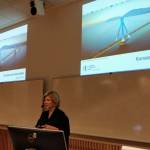 People are increasingly interested in sustainability and worried about the effects of climate change. Funding and investing in sustainable projects is one of the solutions on the road towards a more sustainable future. The role of finance in solving sustainability challenges was discussed by Eila Kreivi from the European Investment Bank at her LFC lecture at Tampere University.
People are increasingly interested in sustainability and worried about the effects of climate change. Funding and investing in sustainable projects is one of the solutions on the road towards a more sustainable future. The role of finance in solving sustainability challenges was discussed by Eila Kreivi from the European Investment Bank at her LFC lecture at Tampere University.
The first Leadership for Change lecture of the year 2019 was given by Eila Kreivi, Director and Head of the Capital Markets Department in the European Investment Bank (EIB). Ms. Kreivi has been working at the EIB with sustainable investing for a long time and thus she was able to give insight knowledge and examples on the past, current and future states of sustainable investing.
Ms. Kreivi is sometimes referred to as the “Mother of the Green Bonds”, as she was one of the key drivers when the EIB first issued green bonds about ten years ago. Green bonds mean “a bond for the planet”, as with green bonds, the EIB allocates money collected from the investors to projects that protect the environment and innovate for a more prosperous future. With green bonds, the EIB loans money for sustainable projects that can, for example, change the way energy is produced. Ms. Kreivi shared the example of Hellisheidarvirkjun Geothermal Power Station in Iceland, where the EIB lent money to expand the power plant’s capacity in 2009. Today, Hellisheidarvirkjun is one of the biggest geothermal power plants in the world in terms of installed capacity and it produces electricity to the city of Reykjavik. Hellisheidarvirkjun is located on a volcano and it cuts about 1,5 million tonnes of CO2 emissions each year which corresponds to the emissions of about 800 000 cars on the streets each year.
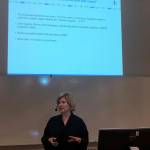 Ms. Kreivi emphasised that the investors are constantly pushing for more information and they want to know where their money goes to in ever increasing detail. Thus, transparency is a vital element of green bonds and the EIB, along with other interested actors, has developed and implemented several different ways to promote and show transparency. One of these methods is the Green Bond Principles, which are guidelines and best practices about what are acceptable levels in terms of green bonds and sustainable financing. The EIB also uses impact reporting to tell the investors what has been done with the project and what are the exact impacts and outcomes, for instance how much carbon emissions were cut.
Ms. Kreivi emphasised that the investors are constantly pushing for more information and they want to know where their money goes to in ever increasing detail. Thus, transparency is a vital element of green bonds and the EIB, along with other interested actors, has developed and implemented several different ways to promote and show transparency. One of these methods is the Green Bond Principles, which are guidelines and best practices about what are acceptable levels in terms of green bonds and sustainable financing. The EIB also uses impact reporting to tell the investors what has been done with the project and what are the exact impacts and outcomes, for instance how much carbon emissions were cut.
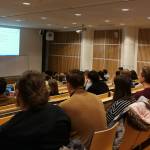
Ms. Kreivi said that “Green bonds are the gateway drug for environmental, social, and governance (ESG) issues more broadly”, as green bonds are looking at achieving sustainability beyond just environmental projects. A change has been ongoing due to several factors, one important one being the United Nation’s Sustainable Development Goals (SDG’s). The SDG’s are 16 goals covering a variety of different aspects of sustainability. Today, the SDG’s are used as a baseline for what people are doing and if their actions are sustainable or not. Ms. Kreivi emphasised that even ‘brown’ investments, such as building roads, should be done in a sustainable way.
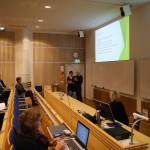
People are increasingly interested in sustainability and worried about the effects of climate change. Furthermore, people desire knowledge and results and the investors are no exception. Funding and investing in sustainability and sustainable projects continues to be a key issue in developing a more sustainable future.This was also highlighted by professor Eija Vinnari who gave a comment after Ms. Kreivi’s lecture. Professor Vinnari raised the question of whether the projects now funded with green bonds would have received financing even without green bond money. Ms. Kreivi replied that when a project is financed with green bonds, the investments are made with the future of the planet in mind, ensuring that the projects are completed in a sustainable manner. Both professor Vinnari and Ms. Kreivi agreed that we are on the right track to a better, more sustainable future, but there is still work to be done for all of us, as climate is all of our business.
Find the full lecture on SoundCloud by following the link!
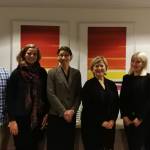
The lecture was organised by first-year LFC students Risto Jouttijärvi, Reetta Grönlund, Maria Toivanen, Alba Maria Vazquez Lopez and Heidi Järvinen.


Comments